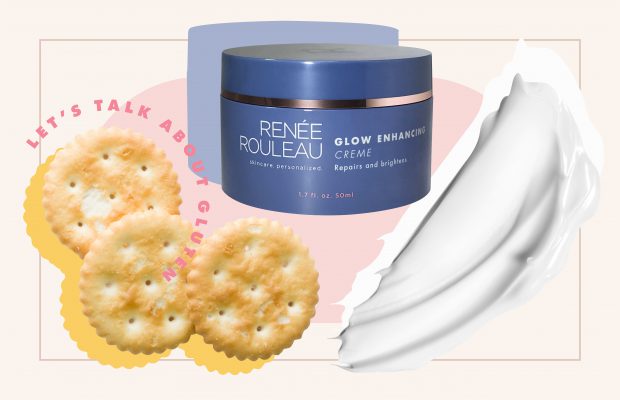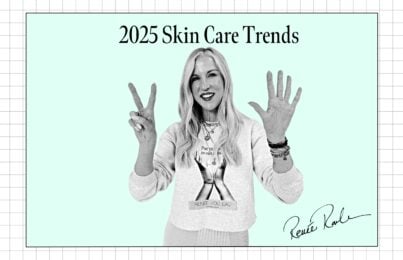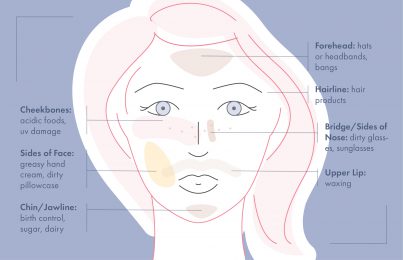In the United States, it’s believed that about 1 in 133 people suffer from celiac disease. In addition, Dr. Alessio Fasano, director of the Center for Celiac Research at Massachusetts General Hospital, estimates that non-celiac gluten sensitivity affects an estimated 20 million people.
As public awareness of celiac disease and gluten sensitivity has continued to grow, people have naturally started to wonder whether this is a concern for topical products as well. I know I personally get asked about this by clients and customers, and I’ve been keeping a close eye on this area of research to be able to give the best advice possible.
What is Gluten, and What Does It Have to Do With Skin?
The term gets thrown around a lot these days, but what is gluten?
Gluten is a protein found in grains like rye, wheat, millet and barley. In people with celiac disease, this protein causes an overactive immune response that damages the small intestine. For this reason, those with celiac disease will avoid gluten in their diets.
No one is quite sure what causes non-celiac gluten sensitivity. There’s still a lot of research to be done in this field, but one thing is clear: gluten makes some people feel unwell, even if they don’t have celiac disease.
In addition to the obvious intestinal distress gluten causes for some people, it’s been linked to skin conditions such as rosacea, eczema, psoriasis, and other types of dermatitis. While cutting gluten from your diet isn’t guaranteed to improve these conditions, it’s something more and more doctors are recommending as research into the gut-skin connection continues to grow.
Dermatitis herpetiformis, on the other hand, is a type of especially itchy, blistering, stinging skin rash that occurs specifically in people with celiac disease. It’s caused by the skin reacting to gluten antibodies circulating through your body. Dermatitis herpetiformis can be greatly improved by avoiding gluten in your diet.
Should Those With Celiac Disease or Gluten Sensitivity Use Gluten-Free Skincare?
The short answer? No.
Since “gluten-free” has become a trendy buzzword, some companies have started labeling their skincare products as gluten-free. However, according to the Mayo Clinic, people diagnosed with celiac disease DO NOT need to use gluten-free products. This is because gluten is only absorbed through the GI tract and not through the skin (gluten molecules are too large to penetrate the skin barrier).
Any skin conditions that may be exacerbated or caused by celiac disease (rosacea, eczema, psoriasis, dermatitis herpetiformis) are due to ORAL consumption of gluten, NOT topical use of skincare products with gluten.
That said, if you have full-blown celiac disease products containing gluten should not be applied to the lips. Care should also be taken around the mouth area (though it’s unlikely you would ingest enough of a product to cause problems). Do keep an eye on how your skin reacts to these products and if you’re ever unsure, talk to your doctor.
Topical Gluten Allergy
The Mayo Clinic also notes that it is technically possible to have a skin reaction to topical products containing gluten, which could be caused by an allergy to wheat or another grain. This isn’t linked to celiac disease or a gluten sensitivity, though. It’s technically possible to be allergic to any ingredient and isn’t an issue specific to gluten-containing ingredients. If a reaction like this occurs, see your doctor to help you identify the cause.
Which Skincare Ingredients Contain Gluten?
If you are someone with celiac disease and still prefer to use gluten-free products, the choice is certainly yours! In this case, look for the following ingredients on your skincare labels:
- Triticum vulgar (wheat)
- Hordeum vulgar (barley)
- Avena sativa oat kernel extract (oatmeal)
- Sodium lauroyl oat amino acids (oats)
Note: In some cases, vitamin E can contain gluten IF it’s derived from wheat germ. That said, the processing of oils such as wheat germ oil should, in fact, remove all starches and proteins. This means wheat germ oil should be gluten-free. If you have a question about vitamin E in a specific product, it’s best to contact the company or manufacturer.
Renée Rouleau Products Containing Gluten
You can find more information on each individual product page, but if you prefer to avoid gluten in your products, avoid the following from my line:
- Purifying Face Wash
- Intensive Firming Neck Creme
Curious about nutrition and skincare? Learn more about how the food we eat affects the skin.
Want to learn more about products? Read about “clean” beauty and the safety of skincare ingredients.
Celebrity Esthetician & Skincare Expert
As an esthetician trained in cosmetic chemistry, Renée Rouleau has spent 35 years researching skin, educating her audience, and building an award-winning line of products. Her hands-on experience as an esthetician and trusted skin care expert has created a real-world solution — products that are formulated for nine different types of skin so your face will get exactly what it needs to look and feel its best. Trusted by celebrities, editors, bloggers, and skincare obsessives around the globe, her vast real-world knowledge and constant research are why Marie Claire calls her “the most passionate skin practitioner we know.”




Comments:
What products do you recommend for eczema?
Posted By: Sarah |
We have a wonderful cream for eczema Sarah, you can find it here. https://www.reneerouleau.com/PhytolipidComfortCream.aspx Also, read this blog post as it also applies to eczema https://blog.reneerouleau.com/my-cure-for-red-sensitive-extremely-dry-flaky-skin/
Posted By: Renée Rouleau |